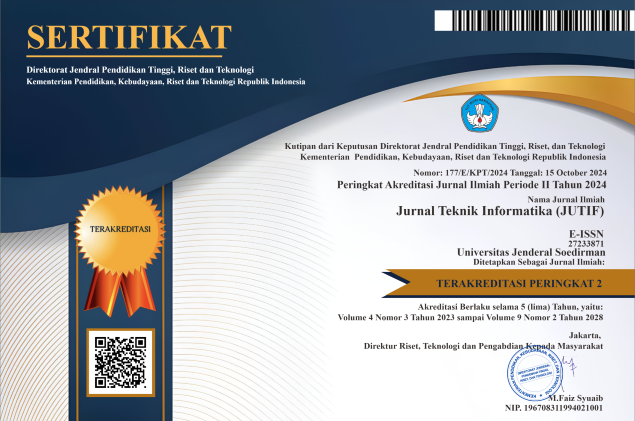IMPROVEMENT OF NAIVE BAYES ALGORITHM IN SENTIMENT ANALYSIS OF SHOPEE APPLICATION REVIEWS ON GOOGLE PLAY STORE
DOI:
https://doi.org/10.52436/1.jutif.2023.4.6.1486Keywords:
marketplace, Naive Baiyes, Sentiment analysis, TF-IDFAbstract
Reviews of the shopee application on the google play store are included in useful information if processed properly. Old or new users can analyze app reviews to get information that can be used to evaluate services. The activity of analyzing application reviews is not enough just to see the number of stars, it is necessary to see the entire contents of the review comments to be able to know the intent of the review. A sentiment analysis system is a system used to automatically analyze a review to obtain information including sentiment information that is part of an online review. The data is classified using Naive Bayes. A total of 1,000 shopee app user reviews were collected to form the sample dataset. The purpose of this study is to determine the sentiment analysis of shopee application reviews in the Google Play Store using the Naive Bayes algorithm. The stages of this research include, data collection, labeling, pre-processing, sentiment classification, and evaluation. In the pre-processing stage there are 6 stages, namely Cleaning, Case folding, Word Normalizer, Tokenizing, Stopword Removal and Stemming. TF-IDF (Term Frequency - Inverse Document Frequency) method is used for word weighting. The data will be grouped into two categories, namely negative and positive. The data will then be evaluated using accuracy parameter testing. The test results show an accuracy value of 81%, this result shows that shopee application reviews tend to be negative.
Downloads
References
D. Pranitasari and A. N. Sidqi, “Analisis Kepuasan Pelanggan Elektronik Shopee menggunakan Metode E-Service Quality dan Kartesius,” Jurnal Akuntansi dan Manajemen, vol. 18, no. 02, pp. 12–31, 2021, doi: 10.36406/jam.v18i02.438.
N. C. Agustina, D. Herlina Citra, W. Purnama, C. Nisa, and A. Rozi Kurnia, “The Implementation of Naïve Bayes Algorithm for Sentiment Analysis of Shopee Reviews on Google Play Store,” MALCOM: Indonesian Journal of Machine Learning and Computer Science, vol. 2, no. 1, pp. 47–54, 2022.
P. Subarkah et al., “SENTIMENT ANALYSIS ON REVIEWS OF WOMEN ’ S TOPS ON SHOPEE,” vol. 9, no. 1, pp. 126–133, 2023, doi: 10.33480/jitk.v9i1.4179.INTRODUCTION.
E. H. Muktafin, K. Kusrini, and E. T. Luthfi, “Analisis Sentimen pada Ulasan Pembelian Produk di Marketplace Shopee Menggunakan Pendekatan Natural Language Processing,” Jurnal Eksplora Informatika, vol. 10, no. 1, pp. 32–42, 2020, doi: 10.30864/eksplora.v10i1.390.
A. Rahman, E. Utami, and S. Sudarmawan, “Sentimen Analisis Terhadap Aplikasi pada Google Playstore Menggunakan Algoritma Naïve Bayes dan Algoritma Genetika,” Jurnal Komtika (Komputasi dan Informatika), vol. 5, no. 1, pp. 60–71, 2021, doi: 10.31603/komtika.v5i1.5188.
D. Darwis, N. Siskawati, and Z. Abidin, “Penerapan Algoritma Naive Bayes Untuk Analisis Sentimen Review Data Twitter Bmkg Nasional,” Jurnal Tekno Kompak, vol. 15, no. 1, p. 131, 2021, doi: 10.33365/jtk.v15i1.744.
N. Hendrastuty et al., “Analisis Sentimen Masyarakat Terhadap Program Kartu Prakerja Pada Twitter Dengan Metode Support Vector Machine,” Jurnal Informatika: Jurnal Pengembangan IT, vol. 6, no. 3, pp. 150–155, 2021.
B. Gunawan, H. S. Pratiwi, and E. E. Pratama, “Sistem Analisis Sentimen pada Ulasan Produk Menggunakan Metode Naive Bayes,” Jurnal Edukasi dan Penelitian Informatika (JEPIN), vol. 4, no. 2, p. 113, 2018, doi: 10.26418/jp.v4i2.27526.
R. Apriani et al., “Analisis Sentimen dengan Naïve Bayes Terhadap Komentar Aplikasi Tokopedia,” Jurnal Rekayasa Teknologi Nusa Putra, vol. 6, no. 1, pp. 54–62, 2019.
G. C. Habek, M. A. Toçoğlu, and A. Onan, “Bi-Directional CNN-RNN Architecture with Group-Wise Enhancement and Attention Mechanisms for Cryptocurrency Sentiment Analysis,” Applied Artificial Intelligence, vol. 36, no. 1, 2022, doi: 10.1080/08839514.2022.2145641.
W. Khofifah, D. N. Rahayu, and A. M. Yusuf, “Analisis Sentimen Menggunakan Naive Bayes Untuk Melihat Review Masyarakat Terhadap Tempat Wisata Pantai Di Kabupaten Karawang Pada Ulasan Google Maps,” Jurnal Interkom: Jurnal Publikasi Ilmiah Bidang Teknologi Informasi dan Komunikasi, vol. 16, no. 4, pp. 28–38, 2022, doi: 10.35969/interkom.v16i4.192.
P. M. S. Tarigan, J. T. Hardinata, H. Qurniawan, M. Safii, and R. Winanjaya, “Implementasi Data Mining Menggunakan Algoritma Apriori Dalam Menentukan Persediaan Barang,” Jurnal Janitra Informatika dan Sistem Informasi, vol. 2, no. 1, pp. 9–19, 2022, doi: 10.25008/janitra.v2i1.142.
A. Ridwan, “Penerapan Algoritma Naïve Bayes Untuk Klasifikasi Penyakit Diabetes Mellitus,” Jurnal SISKOM-KB (Sistem Komputer dan Kecerdasan Buatan), vol. 4, no. 1, pp. 15–21, 2020, doi: 10.47970/siskom-kb.v4i1.169.
D. D. A. Yani, H. S. Pratiwi, and H. Muhardi, “Implementasi Web Scraping untuk Pengambilan Data pada Situs Marketplace,” Jurnal Sistem dan Teknologi Informasi (JUSTIN), vol. 7, no. 4, p. 257, 2019, doi: 10.26418/justin.v7i4.30930.
H. Syah and A. Witanti, “Analisis Sentimen Masyarakat Terhadap Vaksinasi Covid-19 Pada Media Sosial Twitter Menggunakan Algoritma Support Vector Machine (Svm),” Jurnal Sistem Informasi dan Informatika (Simika), vol. 5, no. 1, pp. 59–67, 2022, doi: 10.47080/simika.v5i1.1411.
L. Nguyen-Thi-Huong, H. Nguyen-Viet, A. Nguyen-Phuong, and D. Van Nguyen, “How does digital transformation impact bank performance?,” Cogent Economics and Finance, vol. 11, no. 1, 2023, doi: 10.1080/23322039.2023.2217582.
J. Muliawan, E. Dazki, and R. D. Kurniawan, “SENTIMENT ANALYSIS OF INDONESIA’S CAPITAL CITY RELOCATION USING THREE ALGORITHMS: NAÏVE BAYES, KNN, AND RANDOM FOREST,” Jurnal Teknik Informatika (JUTIF), vol. 4, no. 5, pp. 1227–1236, 2023, doi: 10.52436/1.jutif.2023.4.5.347.



























